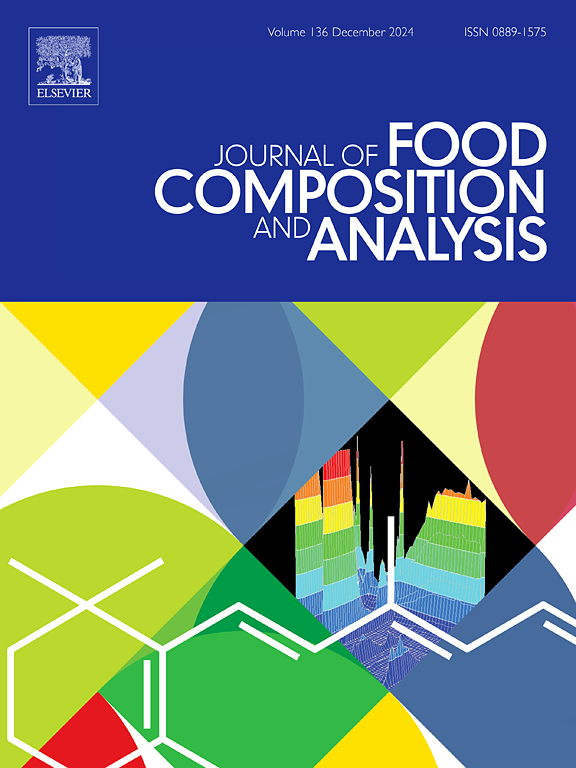Characterization of oil body microstructure, accumulation level and chemical composition in walnut fruit during growth
IF 4
2区 农林科学
Q2 CHEMISTRY, APPLIED
引用次数: 0
Abstract
Oil body (OB) is composed of phospholipids, proteins and neutral lipids. However, the changes of these components in walnut OB (WOB) during walnut growth have not been studied. In this paper, CLSM, TEM and LC-MS/MS were used to observe and quantify the microstructure, accumulation level and biochemical composition of WOB during the growth of walnut (Wen 185 cultivar). The results showed that WOB accumulated near the cell wall on day 60 and then toward the center of cell until it occupied the entire cell on day 88. Afterwards, the WOB began to grow and fuse. Analysis of the chemical composition of WOB indicated that phosphatidylcholine, phosphatidylethanolamine, phosphatidylglycerol, phosphatidylinositol, and phosphatidylserine and oleosins, caleosins, and steroleosins made up the WOB membrane. The core of the WOB consisted of 22 free fatty acids and monoacylglycerol, diglyceride, triglyceride. Phosphatidylcholine, triglyceride and oleosin contents continued to increase. The contents of phosphatidylglycerol, unsaturated fatty acids, caleosins and steroleosins continued to decline. The content of phosphatidylethanolamine, phosphatidylinositol and phosphatidylserine remained basically unchanged. These findings provided a basis for understanding the dynamic pattern of WOB bioaccumulation in walnut kernel at different developmental stages.
核桃果实生长过程中油体微观结构、积累水平和化学成分的表征
油体(OB)由磷脂、蛋白质和中性脂质组成。然而,核桃油体(WOB)中这些成分在核桃生长过程中的变化尚未得到研究。本文采用 CLSM、TEM 和 LC-MS/MS 对核桃(Wen 185 栽培品种)生长过程中 WOB 的微观结构、积累水平和生化成分进行了观察和定量。结果表明,WOB 在第 60 天时在细胞壁附近积聚,然后向细胞中心积聚,直到第 88 天时占据整个细胞。之后,WOB 开始生长和融合。对WOB化学成分的分析表明,磷脂酰胆碱、磷脂酰乙醇胺、磷脂酰甘油、磷脂酰肌醇、磷脂酰丝氨酸以及油蛋白、鲸蜡蛋白和甾醇溶蛋白构成了WOB膜。WOB 的核心由 22 个游离脂肪酸和单酰甘油、二甘油、甘油三酯组成。磷脂酰胆碱、甘油三酯和油脂素的含量继续增加。磷脂酰甘油、不饱和脂肪酸、鲸蜡糖苷和甾烯糖苷的含量继续下降。磷脂酰乙醇胺、磷脂酰肌醇和磷脂酰丝氨酸的含量基本保持不变。这些发现为了解核桃仁在不同发育阶段的 WOB 生物累积动态模式提供了依据。
本文章由计算机程序翻译,如有差异,请以英文原文为准。
求助全文
约1分钟内获得全文
求助全文
来源期刊

Journal of Food Composition and Analysis
工程技术-食品科技
CiteScore
6.20
自引率
11.60%
发文量
601
审稿时长
53 days
期刊介绍:
The Journal of Food Composition and Analysis publishes manuscripts on scientific aspects of data on the chemical composition of human foods, with particular emphasis on actual data on composition of foods; analytical methods; studies on the manipulation, storage, distribution and use of food composition data; and studies on the statistics, use and distribution of such data and data systems. The Journal''s basis is nutrient composition, with increasing emphasis on bioactive non-nutrient and anti-nutrient components. Papers must provide sufficient description of the food samples, analytical methods, quality control procedures and statistical treatments of the data to permit the end users of the food composition data to evaluate the appropriateness of such data in their projects.
The Journal does not publish papers on: microbiological compounds; sensory quality; aromatics/volatiles in food and wine; essential oils; organoleptic characteristics of food; physical properties; or clinical papers and pharmacology-related papers.
 求助内容:
求助内容: 应助结果提醒方式:
应助结果提醒方式:


